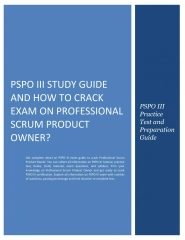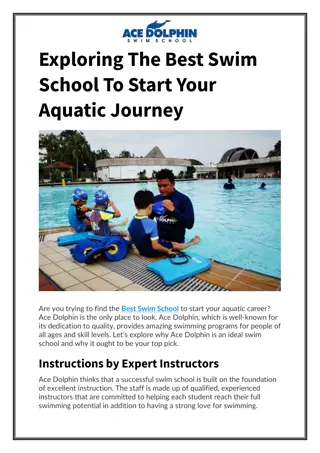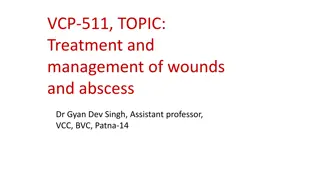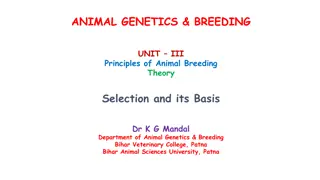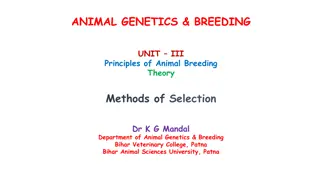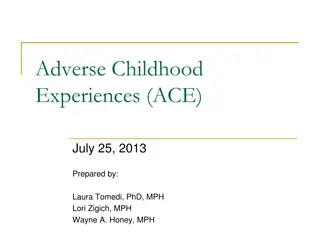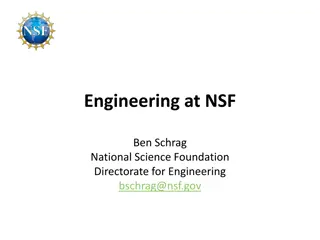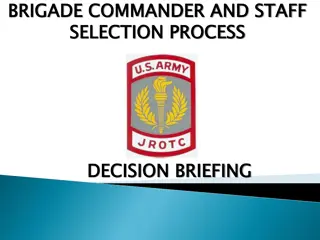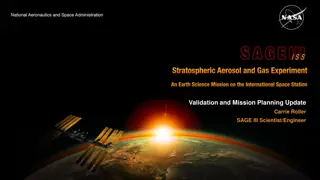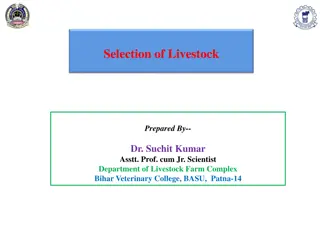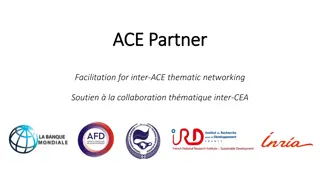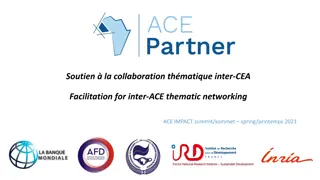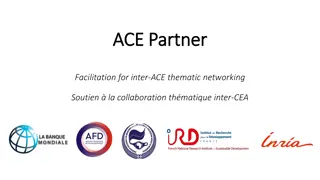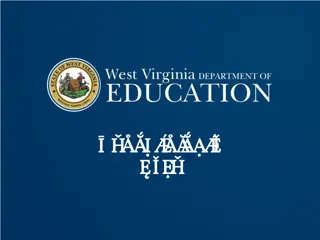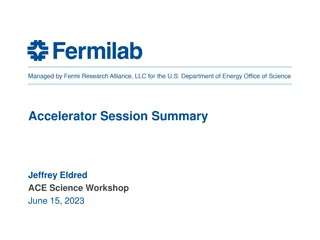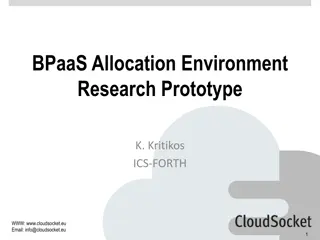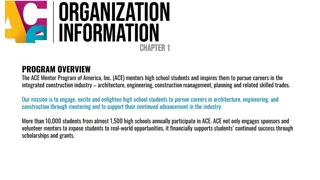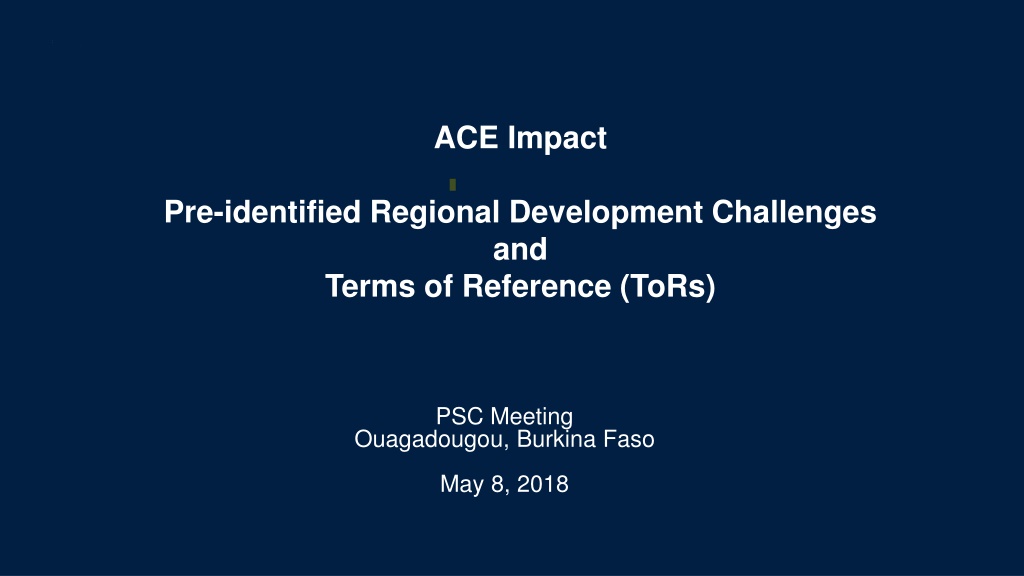
Development Challenges and Terms of Reference for ACE Impact Project
Explore the pre-identified regional development challenges and terms of reference for the ACE Impact project, covering various sectors like applied sciences, engineering, technology, health, energy, and more. Proposals are required to align with these challenges and ToRs to be considered for support.
Download Presentation

Please find below an Image/Link to download the presentation.
The content on the website is provided AS IS for your information and personal use only. It may not be sold, licensed, or shared on other websites without obtaining consent from the author. Download presentation by click this link. If you encounter any issues during the download, it is possible that the publisher has removed the file from their server.
E N D
Presentation Transcript
ACE Impact Pre-identified Regional Development Challenges and Terms of Reference (ToRs) PSC Meeting Ouagadougou, Burkina Faso May 8, 2018
Pre-Identified Regional Development Challenges for ACE Impact Broad Themes Sectors Applied Sciences, Engineering, Technology Health Energy (power) Information and Communications Technology (Big Data) Water Nursing and Professional health trainers Education Education STEM / Excellence in teacher training Environment Environment - Costal Resilience Environmental science and applied Impact assessment Transport logistics (policies, economics, urban planning, traffic management, ICT etc.) Urban Planning and Design Housing/Land Development Quantitative Economics Urbanization and Transport Others 2
Terms of Reference Developed in conjunction with stakeholders and experts Consistent Format Skills Needs Long-term Master s and PhDs Short-term courses Applied Research Needs Specific topical areas Expected products, reports, data Core Partnerships Industry/sectoral Academic (regional and global) 3
Terms of Reference Proposals must respond to the Terms of Reference within the regular proposal sections Address the capacity of, and the vision for, the proposed center to meet ToR The proposal must be within the scope (and budget) of ACE Impact Guidance Proposals that respond to the XXXXXX Pre-identified Regional Development Challenge should address the following Terms of Reference(ToRs) in the appropriate section of the proposal. While it is unlikely that a single proposal can address all of the ToRs, the proposal should make a substantial, credible effort to respond in a way that presents a cohesive, integrated program of education, research and partnership activities that aligns both with the ToRs and with the goals of the ACE Impact project. X 4
Evaluation and Selection At least one ACE Impact center will be supported in each of the Pre-identified Regional Development Challenge areas Can be new center or a renewal proposal Same broad evaluation criteria, PLUS: Does the proposal effectively address the ToRs YES/NO How does the proposal address the ToRs - 30 additional points 5
ACE Impact Pre-identified Regional Development Challenge Coastal Degradation Terms of Reference Guidance Proposals that respond to the Coastal Degradation Pre-identified Regional Development Challenge should address the following Terms of Reference(ToRs) in the appropriate section of the proposal. While it is unlikely that a single proposal can address all of the ToRs, the proposal should make a substantial, credible effort to respond in a way that presents a cohesive, integrated program of education, research and partnership activities that aligns both with the ToRs and with the goals of the ACE Impact project. Background The West African coastal areas (WACA) are home to almost one-third of the countries population. Rapid urbanization and net migration to the coast increase the demands on the land, its resources, and the services its ecosystem provides to people. The coastal population especially the poor, who livelihoods depend on the quality and quantity of natural resources - is increasingly vulnerable to the effects of climate change. The sandy coastal areas are eroding at many locations, and the highest rates of retreat (in the order of 10 meters per year or more) occur near river mouths and harbor jetties (e.g. in the most urbanized areas). The situation is further compounded by the lack of coordination of anti- erosion solutions, at local, national, and international levels. The shoreline is subject to: severe recession due to construction of major infrastructure interrupting sediment flow; degradation of natural formations serving as buffers against the sea (mangroves); extraction of sand from dunes and the multiplication of dams on rivers; and poorly designed and inadequately managed groynes, seawalls, and breakwaters that deprive these fragile coastal areas of important sediment deposits. Countries adopting Integrated Coastal Zone Management (ICZM) require a set of institutional and technical competencies - from civil engineering to land-use planning, and multi-sectoral coordination. It is important that West and Central Africa build the capacities (in the public and private sphere) to lead and coordinate these technical studies and to develop national strategies.
Terms of Reference I.The selected Africa Center of Excellence in Coastal Degradation will consider the following skills related aspects of the Development Challenge 1.Coastal engineering (design of adaptation solutions for coastal risk reduction) 2.Forestry engineering for nature-based solution 3.Maritime meteorology and oceano-hydrology modeling 4.Natural capital accounting 5.Coastal zone land-use planning II.To address the skills needs, long-term degree programs available through the Center should include: Master s Degree Programs 1.M.S. in Coastal and Marine Engineering and Management 2.M.S. in Maritime Meteorology Ph.D. Programs 1.Ph.D. in Coastal Engineering 2.Ph.D. in Coastal Zone Management III.To address professional trainings needs, short term courses should include: Short Term Courses 1.Coastal Structure 2.Use of Nature-based Solutions for Disaster Risk Management (DRM) 3.Use of Remote Sensing for Coastal Area Monitoring and Management
I. The selected Africa Center of Excellence in Coastal Degradation will undertake an applied research program that includes the following themes: Applied Research Themes 1.Impact of Eco-systems in the Region on Risk Reduction 2.Future Weather and Sea-conditions Forecasting 3.Integration of the Values of the Eco-systems in National Budgets and Planning 4.Application of Economics Natural Capital Approaches for Nature-based Solutions to attract Private Enterprise 5.Poverty Co-benefits of Eco-system based DRM Measures 6.Prediction of Changes in Sediment Balance Because of Human Interventions (dams, groynes, ports) 7.Sediment Management and Co-benefits II.The selected Africa Center of Excellence in Coastal Degradation will have an established network of core industry/sectoral partners identified in the proposal, including: 1.Engineering companies 2.Port and infrastructure management companies 3.Representatives from the tourism sector 4.International organizations with significant activities focused on coastal degradation. III.The selected Africa Center of Excellence in Coastal Degradation will have an established network of academic and/or research institute partners identified in the proposal, including: 1.Regional universities that maintain active education and/or research activities focused on coastal degradation 2.Recognized global universities that maintain active international research collaborations focused on coastal degradation.
ACE Impact Proposed Selection process PSC Meeting Ouagadougou, Burkina Faso May 8, 2018
Proposed Framework Number of submissions per country Maximum 3x the number of potential Centers to be funded (based on IDA envelope) Types of Centers New ACE Centers (Sub-component 1.1) Renewal of ACE 1 Centers (Sub-component 1.2) Pre-identified Regional Development Challenge Centers either 1.1 or 1.2 Support for emerging Center (Sub-component 2.1) This session will focus on ACE Impact Subsection 1.1 Subsection 1.2 (previous results) Pre-identified Regional Development Challenge (addressing ToRs) Subcomponent 2.1 (noncompetitive) College of Engineering Strengthening 10
Proposed Selection Process Selection Process is composed of Evaluation and Decision Evaluation 1. Desk Evaluation 2. On-site Evaluation Visits 3. Final Panel Meeting Decision By Steering Committee Well-defined rules of selection 11
Proposed Evaluation Process Ensuring that the Evaluation Process and criteria reflect the language and prioritization inherent in the Call for Proposals Ensuring that the Evaluation Process is transparent and merit-based Evaluation will be: Consistent with International Standards Conducted by African and international experts, including diaspora No World Bank Evaluators Strict Conflict of Interest Rules (Grievance process) 12
Desk Evaluation Desk Evaluation Based upon the written proposal submitted Evaluation by 3 external reviewers Scoring rubric Written comments Panel discussion 13
Evaluation Process ACE For Impact Desk Evaluation PROPOSAL for New Centers Criteria Relevance to the Development Challenge Regionalization Students Academic Partners Strategy Education Responsiveness to skills gap Excellence in education Impact in education Research Scientific merit Capacity and resources available and planned Relevance of research Depth of Industry/Sector Engagement Financial Support Intellectual and Vision support Points 10 15 20 15 10 14
Evaluation Process ACE For Impact Desk Evaluation PROPOSAL for New Centers (continued) Criteria Points Center Organizations and Structure Management Operations Implementation Potential for Institutional Impact 10 5 Center and Institutional Capacity to host successful Center 5 Sustainability Plan 5 Integration of Proposal Elements Does the proposal present a compelling case for support? Does the proposal put forward an integrated, visionary plan? Total 5 100 15
Evaluation Process ACE For Impact Desk Evaluation PROPOSAL for Center Renewals Based upon the Evaluation Process for New Centers Aligns with additional information required in proposal Section on Results from ACE I project Integration of ACE I results into relevant proposal sections Same broad evaluation criteria as new center proposals, PLUS: 10 points for Discussion of Results from ACE 1 16
Evaluation Process ACE For Impact Desk Evaluation PROPOSAL for Pre-identified Regional Development Challenge Based upon the Evaluation Process for New Centers Proposals must address the Terms of Reference (ToRs) Integrated within the Proposal Sections Same broad evaluation criteria as new center proposals, PLUS: Does the proposal effectively address the ToRs YES/NO How does the proposal address the ToRs - 30 additional points 17
Evaluation Process ACE For Impact Desk Evaluation PROPOSAL for Component 2.1 Based upon the Evaluation Process for New Centers Noncompetitive process Proposals must address Development Challenge Proposals must include regional networking with ACE Centers Proposals will be evaluated by independent experts 18
On-Site Evaluation Visits On-Site Evaluation Visits Evaluation by 3 external, independent reviewers Scoring rubric Written comments Only the top half evaluated proposals from Desk Evaluation will have On-Site Visit Evaluation team will meet with: University Leadership Industry/Sectoral partners Center Leadership Faculty Postgraduate Students 19
Evaluation Process ACE For Impact On-site Evaluation PROPOSAL Criteria Institutional Leadership and Project Ownership Points 10 Potential for Institutional Impact 5 Government Involvement and Ownership 5 Center Leadership 10 Center Management and Administrative Capacity 10 Resources current and planned 5 Center and Institutional Capacity to Implement Proposed Activities 5 Industry/Sector Commitment (based on on-site visit) 10 Education (based upon Desk/Panel Review) 20 Research (based upon Desk/Panel Review) 15 Center Vision 5 Total 100 20
Evaluation Process ACE For Impact On-site Evaluation PROPOSAL for Center Renewals Based upon the Evaluation Process for New Centers Aligns with additional information required in proposal Section on Results from ACE I project Integration of ACE I results into relevant proposal sections Same broad evaluation criteria as new center proposals, PLUS: 15 points based upon Results from ACE I Is the Center positioned to build upon its accomplishments Should a renewal of this center be a priority in ACE Impact 21
Proposed Selection Process Independent Expert Panel will: 1. Identify top proposal (new or renewal) in each pre-identified regional development challenge 2. Identify highest ranking new proposals (top 5 or 6; may include those in (1) above) 3. Priority to Existing Centers (with justification) 4. Rank remaining proposals 5. Identify leading proposals from each country involved in ACE for Impact 6. Rank proposals by broad thematic area (e.g. Health; Agriculture; Climate) Steering Committee will make Decision on ACE Impact Centers to be funded With well-defined rules of selection Ensuring all centers selected are relevant to Development Challenges Selected Centers reflect a broad portfolio balance: Topic/thematic area Country Language New/Renewal 22





